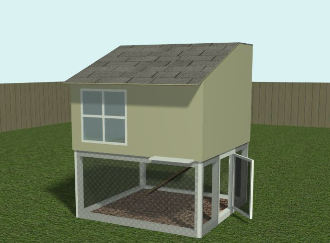Chicken feed: pellets or mash?
The mainstay of pet chickens’ diet is usually either pellets or layers’ mash and most will accept either quite happily. The choice is more yours as to what works out best for your pocket.
We have experimented with both but opted for mash in the end. When we tried pellets, we thought that the chickens were getting through an awful lot, but gradually started discovered huge stores of pellets outside the run that had obviously been carried away by the local vermin population.
Another reason for choosing mash was pure practicality. We prefer to buy our chicken feed locally and have recently discovered a small poultry farm nearby which we can also get mash from. It feels good knowing it was all grown just a few fields away and it is very good value to boot.
However, some people prefer pellets because the chickens tend not to chuck them around as much as the grain so you get less wastage in that respect. I’d recommend trying both and decide what works out best for you.
You can buy chicken feed, pellets or mash, online or from agricultural merchants.
Other dietary additions
As well as either mash or pellets, chickens can also benefit by small nutritional additions to their feed. Sunflower seeds are an excellent example. The chickens love them and they are a great source of omega6.
However, as with anything, you don’t want to go over the top with the sunflower seeds.
Chickens aren’t usually too fussy about what you feed them but they really do enjoy some greenery being added to their diet. It is good to hang up a lettuce or some other vegetable for them to peck at from time to time as it gives them some amusement.
Foods to avoid
Feeding chickens kitchen scraps is generally fine, as long as you are selective. Do avoid:
– meat
– avocados (http://en.wikipedia.org/wiki/Persin)
– green peppers
– onions
– garlic (if you don’t want garlic-y eggs)
As a point of interest, when we bought our Marans we were told by the farmer not to feed them any kitchen scraps at all and to stick to chicken feed. No such warning was given when we bought our Black Rocks, who have a reputation for being bomb proof. It might be worth checking with whoever you buy your chickens from what is best for that particular breed.
Choosing a chicken feeder
When choosing a chicken feeder in which to put your pellets or mash, you basically have a choice of plastic or metal. We always go for metal feeders as we keep them outdoors and the plastic ones easily blow away if they are exposed to the elements. They are really only practical for feeding inside coops.
We buy metal pheasant feeders like these as they are sturdy enough to withstand strong winds and only rarely get knocked over by the chickens.
Choosing a drinker for your chickens
Chickens need to have access to water at all times. The metal drinker vs plastic drinker debate is exactly the same as with chicken feeders and for that reason we recommend metal drinkers like these. It is worth getting the largest size that you can find as you don’t want your pet chickens to ever run out of water.
Author: Julian James of All About Chickens, the online guide on how to keep chickens. With information on topics as diverse as what to feed chickens to how to breed chickens, it is useful for poultry enthusiasts both new and experienced.
Related Laying Chickens Articles



Leave a Reply